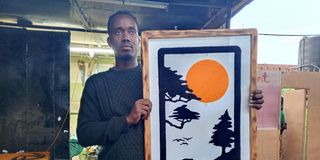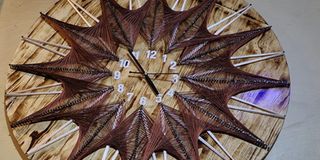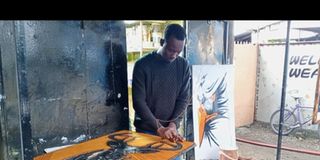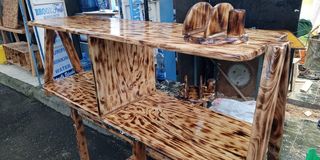Biz Lounge: A movie scene kick starts string art business for 29-year-old

Davis Kagia holds one of his artworks at his workshop in Nakuru city.
Davis Kagia sold his first embroidery art of the cartoon 'Ricky' (of Ricky and Morty) in 2018.
Then, he was a second year student at Egerton University, undertaking a degree course in Procurement.
Selling that artwork to his classmate for Sh 500 revealed the possibility of turning his passion into a viable source of income.
"That first sale made me realize I could sustain myself financially through my art, eliminating the need for pocket money from my parents," Kagia recalls.
Believe it or not, this idea came from a movie, ‘The Little hours’.
In this scene that caught Kagia’s eye, a nun was sewing an embroidery piece.
“I had some yarn under my bed which I had bought for purposes of sewing a floor rug. All I needed was canvas and staple pins which I bought for Sh 2,000,” he says.
Armed with the raw materials, Kagia studied the nun in the movie repeatedly, thus learning how to be a string art master.
What started as a move to satisfy his curiosity turned out to be a fully-fledged business, selling his art to classmates and neighbours.

A wall clock made from yarn is displayed in Davis Kagia's workshop in Nakuru city.
He later expanded his market by setting up roadside stands in Nakuru city to attract more customers.
Upon completing his degree, Kagia dedicated himself fully to his embroidery and string art business.
He notes that since starting the business of selling string art, the most memorable piece was that of a bulldog, which he sold for Sh. 2,500.
Impressively, it takes Kagia only one day to finish a piece.
“Before it would take two to three days, but after practising for about three years, I only take a day,” he says proudly.
The process
The 29-year-old says he embarks on the job by first sketching the model which he transfers to a bigger paper before placing it on plywood.
“When a customer comes to me, we discuss the art they want, size and the budget they have. The budget determines the size of the string art. After agreeing, the client then pays a deposit of 50 percent of the full amount and the balance upon completion,” he notes.

Davis Kagia explains how he creates different artworks using a string at his workshop in Nakuru city.
He continues, "A custom made art is expensive compared to purchasing an already made art piece from the shop."
His artwork prices start at Sh1,000.
"On a good day, I can make up to Sh. 5,000 which has enabled me to employ one person who is an artist. I hope to bring more people on board to build a bigger art company," he says.
Challenges
However, Kagia admits that Nakuru is a pretty tough market for his kind of business.
“A lot of people don’t appreciate this form of art since they assume it’s a simple thing to do. This makes it hard for them to buy at the recommended price.”
Another challenge is the increased price of quality materials.
To curb these challenges, Kagia says he has decided to diversify his income, by venturing into woodwork last year.

Some of the woodwork displayed in Davis Kagia's workshop in Nakuru city.
"Woodwork is easy to learn and allows for unique and creative modifications," he explains.
Despite these challenges, Kagia emphasizes the importance of patience in the art business and encourages parents to support their children in pursuing artistic careers, as they can be financially rewarding.
Looking ahead, Kagia aims to expand his business, balancing embroidery, string art, and woodwork while working towards having an exhibition of his work.


